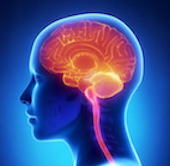 We already know that heavy drinking can damage the brain. On the other hand, many studies found that moderate alcohol consumption could protect against diseases like dementia and Alzheimer’s disease. For the first time, it now appears that alcohol consumption of 11 drinks per week might increase the risk of specific types of brain damage compared to not drinking. The British research was recently published in the scientific journal BMJ.
We already know that heavy drinking can damage the brain. On the other hand, many studies found that moderate alcohol consumption could protect against diseases like dementia and Alzheimer’s disease. For the first time, it now appears that alcohol consumption of 11 drinks per week might increase the risk of specific types of brain damage compared to not drinking. The British research was recently published in the scientific journal BMJ.
Brain damage
The researchers looked at specific indicators of brain damage, looking at brain imaging. Right sided hippocampal atrophy is three times more prevalent in people who drink 11 to 17 glasses (112-168g) of alcohol per week compared to non-drinkers. If you drink even more, prevalence further increases. That is the main conclusion of a study that followed 550 participants, mainly men, in the UK over a period of 30 years1. The risk of left sided hippocampal atrophy was only associated with heavy drinking (> 24 drinks (240g) per week). The results for consumption of less than 11 drinks per week were inconclusive. Hippocampal atrophy is an important marker of Alzheimer’s disease.
Cognitive function
The study also looked at specific indicators of cognitive function. Alcohol consumption of 5-6 drinks (56g) per week was associated with faster decline in lexical fluency, an indicator of language proficiency. Other indicators of cognitive function were not associated with alcohol consumption. There was no evidence of protective effect of light alcohol consumption (up to 5 drinks per week) on cognitive function.
In perspective
It was already known that heavy drinking is associated with dementia, brain atrophy and Korsakoff’s syndrome. Light to moderate alcohol consumption could have a protective effect on cognitive decline and protect against diseases like Alzheimer’s disease and dementia. In this research on specific markers of brain damage, no such protective effect was found. And researchers find a higher prevalence of specific forms of brain damage in people who drink 11 drinks per week. It is unclear to what extent confounding factors play a role in this association. Daily alcohol consumption is also unknown, as only the weekly average was collected. This study shows preliminary results, so no strong conclusions can be made yet. More research is necessary to understand the exact effect of alcohol on the brain.
